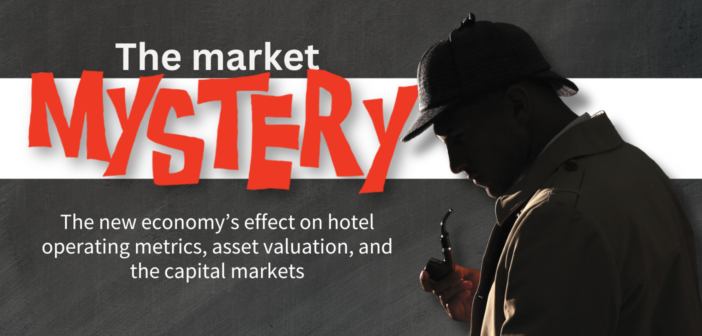The new economy’s effect on hotel operating metrics, asset valuation, and the capital markets
It’s a post-COVID world, but it’s far from normal both personally and professionally. How we live our lives and conduct business has changed. At the forefront of these changes is the increased inflationary pressure on goods and services we continue to face. We’ve watched prices go up on everything – from the most basic household items to the cost of operating businesses. Since the pandemic, daily headlines and overarching pressure to increase prices have sent property taxes, government and private employment wages, and the cost of services sky high. This is new territory for many, as the U.S. economy hasn’t faced a real recession since the influx of cash from both the federal government and the Federal Reserve.
Yet even though recent fiscal and monetary policies are showing signs of reversing the trend, inflationary pressures aren’t diminishing as quickly as business owners would like. Furthermore, during this economic slowdown (mainly led by elevated interest rates), hotel revenues haven’t increased at the same pace as hotel expenses.
IMPACT ON HOTEL VALUATIONS
For limited- and select-service hotels with a Hilton, Marriott, Hyatt, or IHG brand, revenues have increased marginally and may even be close to 2019 levels. However, room expenses, along with general and administrative expenses, have also increased, and at a faster pace than room revenue. Today’s average hotel housekeeper is being paid at least 20% to 30% higher wages than he or she made pre-pandemic. Likewise, a typical hotel general manager (tracked within the general administrative section of hotel) is earning 10% to 15% more today than before COVID hit. These increases have directly impacted hotels’ gross operating profit (GOP) and net operating income (NOI).
Hospitality is as much of an operating business as a real estate transaction. From a pure real estate standpoint, hotel appraisers, valuation experts, and lenders look at the bottom line to determine the level of debt the hotel can support. Because of these ongoing pricing pressures, hotel NOI and GOP have plummeted. For example, before the pandemic, a limited- or select-service hotel – such as a Hampton Inn or Fairfield Inn – would typically drop 35% to 38% of top-line revenue to the bottom line as NOI, or 45% to 47% as GOP. Due to wage and cost pressures, as well as the increase in property taxes and insurance, NOI percentages in the new world are landing at 32%. Rate pressure and higher supply costs have also moved GOP margins closer to 43%. As a result, a hotel that brings in $3.5 million in room revenue and previously had an NOI of $1.225 million, now has an NOI closer to $1.1 million, which is a 10% reduction. If this calculation holds true and all else being equal, the value of the hotel should also drop by 10%.
Looking at this situation and adding in higher interest rates and subsequent higher cap rates, theoretically hotel values should drop even further. That’s not happening, however. It’s clear that many buyers and sellers have not realized their new reality – not to mention costs to replace properties continue to rise. These factors make a case for owners to increase asset prices. When market conditions finally stabilize, however, the crystal ball suggests there will be a slight correction in valuations. Alternatively, hotel ADR will need to rise significantly to keep up with the debt load of these properties.
EFFECTS ON LEVERAGE & FINANCING
NOI compression directly impacts how capital markets, mainly commercial mortgage-backed securities (CMBS) and life insurance companies, evaluate hotels seeking financing. In the previous limited-service hotel with $1.225 million NOI example, a CMBS lender could size the loan at $10 million. With a new, lower NOI of $1.1 million, however, that same asset could only support a $9 million loan amount. If the asset then trades for $15 million, the loan to value (LTV) would have to drop from 67% to 60% LTV. As a result, the borrower would need to bring 7% more equity to the closing table. This type of leveraging creates additional headwinds for hospitality and reduces the expected return for hotel investors.
GETTING TO THE CLOSING TABLE
To navigate today’s economic environment, hotels will need to embrace strategies that increase revenues, mainly by pushing ADR for their assets to keep valuations from getting ahead of themselves. Getting expert help can significantly improve the outcome. An experienced intermediary or banker will know expense industry standards. More importantly they will know how to adjust for one-time, extraordinary CapEx and other expenses to bring cashflows to a more normalized level for lenders and capital sources to evaluate. It’s extremely important to choose the right person to shepherd your transaction because this type of tacit knowledge is invaluable to getting your deal over the finish line.





